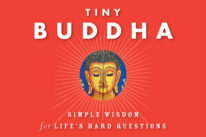
“Sometimes love means letting go when you want to hold on tighter.” ~Unknown
A long time ago now, but once I was in a relationship that was full of great passion and hot desire, but it was also addictive, distracting, and destructive.
When I noticed that it was ultimately bad for me, I knew I had to “get out.” So, I went cold turkey, as they say, and broke up, thinking I would be able to handle it.
Unfortunately, it was much harder than I thought it would be. Every morning I woke up and found myself in the midst of some sort of insanity; my mind and body were filled with thoughts about him.
My mind just wouldn’t stop racing about all that had happened, what I could have said differently, what I could have done differently, what could have happened differently. I lived with this for months and it was a daily dose of hell.
It was at this time, however, that I enrolled to study as a hypnotherapist. When you train to become a therapist, you learn to treat different conditions.
Usually, we had our teacher describing and explaining a therapeutic technique, and then he demonstrated the technique on one of us, which was followed by each of us practicing on each other.
(By the time we had finished the degree, we cured all of each other’s phobias and bad habits, until none was left. This was quite a journey of self-development!)
Soon the day came when the topic was “Suggested Amnesia,” a technique to “erase” unwanted memories. I volunteered immediately, ready to let go of all it all.
The experience was nothing like you would imagine as some cold-war brainwash type of hypnosis.
During the whole procedure, I didn’t lose any of my awareness. At the end, I didn’t lose any of my factual memories, either. But the memory of my tormenting relationship, previously so eminently on my mind, became a dim and vague residue memory as a result of the procedure.
The amnesia worked on the emotional level. The edge of my thinking, which made my life so hellish, was gone. Actually, it taught my brain to fall out of love!
The scientifically interesting background of this experience is about the nature of memory. Since the age of information technology, we tend to think of memory as a kind of data in our brain, which is either stored (remembered) or not (forgotten).
Information is stored in our brain like on a computer, which can be kept on file or erased. Interestingly enough, however, newest psychological experiments show that the analogy for memory as a data bank is not quite accurate.
Memory is not a piece of information from the past simply stored in our brain. Rather, all past events have created imprints on our mind, but those imprints are not static. Our mind constantly works with them and constantly changes memories as its current thinking changes.
Memory is formable. You can change past memories by changing your present state of mind.
How is this possible? Memories are formed as neurological connections in the brain: a certain sequence of connections is fired when the event is happening and later recalled.
The same happens during imagination. When you close your eyes and visualize whatever you want, you’re actually creating new neurological pathways. This means that memory and imagination are created on the same neurological level and therefore one can override the other.
You can try a little experiment. Close your eyes for a minute and think of a person you had a bad experience with.
With your eyes shut, recall the memory of that negative experience. Make it as real as you can: see it like a colorful movie on your mind. See what you saw, hear what you heard, feel what you felt at that time.
Don’t make it too long, just long enough that you can open your eyes and notice the negative feeling coming up with the memory.
After that, close your eyes again. Bring back the last scene of the same movie on your mind, but this time turn the colors black and white, play it backward, and start to shrink the size of the whole picture, until it’s nothing but a tiny dot that disappears into the vast blackness behind your eyelids. Gone.
After that, start to make a new movie, completely out of your imagination, in which the same situation with the same person has a positive outcome.
Maybe the person says something different, or you do, as long as at the end you can see the “enemy” person smiling at you, shaking hands, perhaps even giving you a hug (if that’s within your comfort zone).
After you have effectively created the movie, open your eyes and observe how you feel. You should feel less negative toward this person, neutral, or perhaps even positive.
The difference between your emotions following the first (memory) and the second movie (imagination) is due to new neurological pathways you have created in your mind.
After my experience at the hypnotherapy course, my whole obsession with being “in love” completely changed.
I no longer had those morning thoughts that had previously tormented me for hours after awakening. I no longer had those memories flushing into my life seemingly out of control.
It is sobering to think how much of what is happening to us is actually a product of our own mind. How often do we say, “Oh, I can’t help it … I’m like this … I’m like that,” while it is our own mind that is responsible for our emotional reactions—whether we are conscious of that or not.
I felt great relief. For a moment, I also felt disillusionment. My story was about a broken relationship, but what about good relationships?
“Programming” our minds to fall in and out of love, would that not deprive relationships of all poetry and beauty? Are those happy, loving, and promising relationships also nothing more than connections in our brain?
Of course not, I reminded myself. True love is not generated by our brain; it is a matter of our heart. Luckily, no amount of research, science, and therapy will ever change that.
Woman in pain image via Shutterstock
About Viktoria G. Duda
Viktória G Duda, Ph.D. is a writer, hypnotherapist, and consciousness researcher—but first and foremost an ardent student of human nature, who has widely traveled both the outer and the inner worlds to find meaning. To learn more about her work, please visit her website viktoriaduda.com.













 Though I run this site, it is not mine. It's ours. It's not about me. It's about us. Your stories and your wisdom are just as meaningful as mine.
Though I run this site, it is not mine. It's ours. It's not about me. It's about us. Your stories and your wisdom are just as meaningful as mine. 